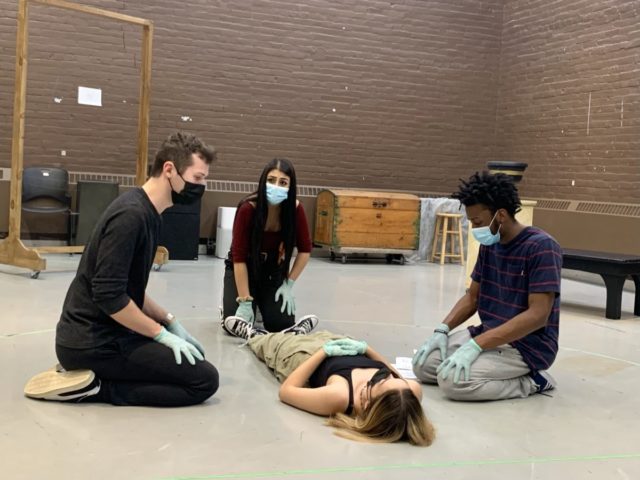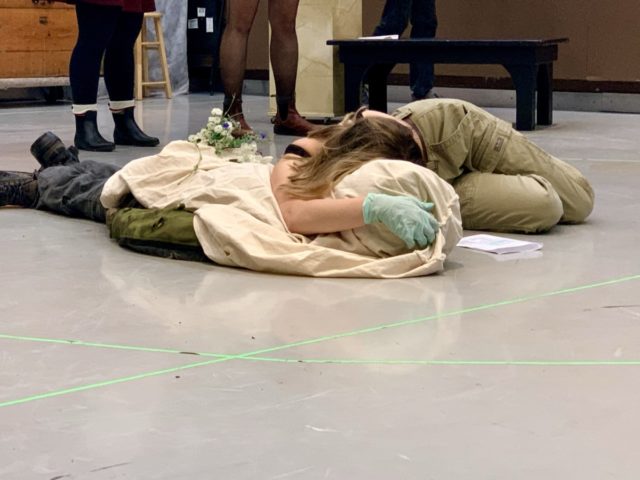Illustration by Katie Doyle
GBC’s Theatre Arts students, who showcase their skills at the Young Centre of Performing Arts in the Distillery District in the third year of their program, will soon kick off their fall season of productions beginning with Shakespeare’s Cymbeline on November 10.
According to the play’s director Aaron Willis, the story’s tone plays on a fine balance of between comedy and tragedy. The mythic Ancient Britain setting, as per his director’s notes, “seems to speak to a hope that Jacobean English society, if it could only reconnect with the inherent goodness at the heart of itself, could somehow transcend and vanquish the dark forces that are trying to rip it apart from inside.”
The daughter of King Cymbeline, Innogen, is exiled when she marries her lowborn childhood sweetheart. The King marries an evil queen stepmother who is plotting to take over the kingdom alongside her arrogant son. A character deceives the male protagonist into believing that Innogen is unfaithful, provoking a murderous rampage. Among the preceding series of events are themes of treachery, revenge and deceit, which must be resolved in order to move forward with reconciliation.
Willis, a professional theatre artist and George Brown alumni since 2001, is spearheading the manifestation of the production at the Young Centre for the Performing Arts. Despite his wide berth of experience directing however, his time with the Theatre Arts students has certainly been unique due to the pandemic.
Willis said a variety of modifications have been made to accommodate restrictions. All students are professionally masked, and the Young Centre for Performing Arts has upgraded its ventilation and added air filters to the rehearsal hall. When physical contact is required, students are required to wear gloves.

GBC theatre students rehearse for their production of Cymbeline, which debuts on November 10.
The team will be integrating masks and gloves into their costumes so students can be protected when social distancing cannot be maintained while staying in character. “It’s navigating the requirements of the play versus keeping everybody safe,” he said.
Additionally, all staff and actors engage in rapid testing twice a week, as is industry standard at the moment. Thanks to the college’s rapid testing availability, Willis says that the process is easy to execute. While not ideal, he hopes that precautionary testing will help students feel safer.
As the maximum theatre capacity is limited to around 20 people, the school will be livestreaming all performances with only a handful of individuals present in-person.
Third-year students Lucy Ellis and Naomi Jijina shared their experience in the program in the midst of COVID-19 with the Dialog.
Ellis was selected to play the part of Innogen and is very excited to take on the role, which will require lots of memorizing and generally “asks a lot.”
Students were not chosen by an audition process – instead, teachers determined casting based on who they believed would be the best fit for the parts. Since the students spend so much time with teachers over their first two years, the latter have a good sense of the former.
“For classes in theatre school, you have to be very vulnerable. And there’s a lot of trust that you need between the students and faculty. So I think that they knew us well enough to cast us in our respective parts,” said Ellis.
The students began preparing for the play with discussions, which are dense and complicated according to Ellis. Once that process was over, the students began exploring their roles and the relationships they have with other characters more via core classes in voice, movement and dance, some offered online and others in-person. Now, students are rehearsing for their shows six times a week on stage again, which many are pleased with given that last year’s graduating class had to do all of their performances online.
Current third-years lost their entire fall semester in 2020. They made up for this time in the summer, essentially having second and third year back-to-back. Ellis feels it has affected the class positively, since they weren’t given the chance to forget their training over summer break.

Students followed strict safety precautions during rehearsals.
The gap that occurred between first and second year was difficult for many. “I didn’t know what to do with myself during that whole break,” said Ellis. “For me, there was a point in time where I forgot why I was acting and why I was doing anything at all, just because I hadn’t been experiencing it like I should have.”
Ellis said that despite all the precautions that need to be taken to work in-person, she much prefers putting up with it over the alternative. However, Ellis noted that acting on Zoom was very different since they had to act for a camera, just like film students. While theatre requires actors to go through the entire journey of a play in front of an audience, TV and film can be recorded out of order. The latter also allows for multiple takes, whereas theatre is a one-shot experience.
“TV and film are much more contained and realistic, whereas with theatre, you have to compensate for the fact that you’re playing for an entire audience that can be quite far away from you and really work a lot harder to embody a role physically,” she said. “And it’s my thought that if you can act for the theater, it’s easier to act for film instead of doing it vice versa.”
All things considered, Ellis is pleased to be back to doing what she loves in-person. Since hands-on experience is vital for many programs in college, she is happy that they were allowed to return to campus much quicker than universities, and that the restrictions meant that the school cared enough to keep students safe.
Naomi Jijina, who will be playing the warrior Belarius in Cymbeline, is happy to be working with the rest of the cast in person despite the very long hours required of her.
Getting to work with everyone all-day every-day in her first two years made it all the more difficult to be apart. Even last year when the program allowed hybrid classes, their class of 30 was divided into two groups to comply with COVID-19 restrictions. “We’re almost like a family unit. We see each other for nine hours a day, Monday to Saturday, so having that distance and having that loss of connection felt even more overbearing as we were so close,” she said.
She also commented on various forms of how she felt more detached from her colleagues. In the past, her contact movement class involved a lot of physical touch, as it was largely about “discovering the connection between your partners and body.” When the pandemic hit, learning in this way became impossible, requiring a huge change in the curriculum. Similarly in voice classes, long gone are the days of doing tongue relaxation exercises because of masks.
In their second year, students weren’t permitted to dance, sing, or engage in combat on stage. The work for these aspects of the play had to be recorded in advance and then shown via a streaming service. For previous third years, entire performances had to be recorded by the actors in their own bedrooms.
“The fact that we have audience members to share with and to connect with you – there’s a huge difference,” she said.
The inability to intimately connect with a partner through actions such as walking up to them or putting your hand on them was particularly difficult for Jijina. Students required approval from the higher-ups whenever they wanted to initiate physical contact.
While she found it frustrating to deal with at first, Jijina ultimately recognized its necessity along with all the other precautions, as it was to keep her and her team safe. She has been quite proud of the fact that no one in the crew has fallen ill all this time.
Jijina remarked on the positives of online class opportunities as well. As she commutes to school from Milton, she was pleased to have more time for herself without the burden of long hours spent travelling.
She agreed wholeheartedly with Ellis, who reflected appreciatively on her experience in the program: “I think as students we’ve been trying to do our best and learn as much as we can through this whole process, understanding that it is normal to be disappointed that we don’t get to do the things that we normally would,” she said.


